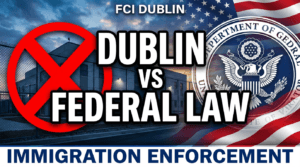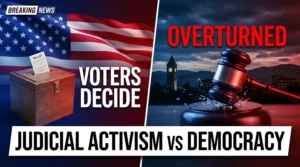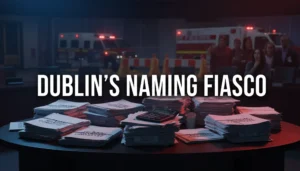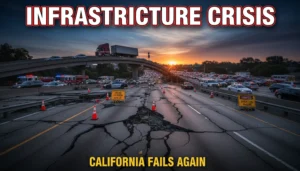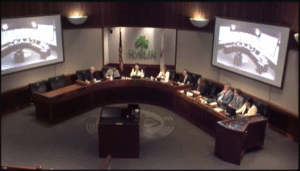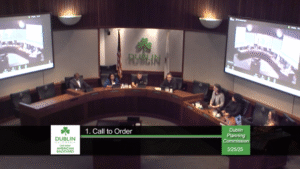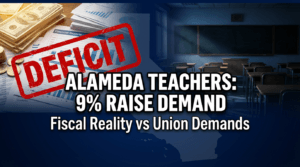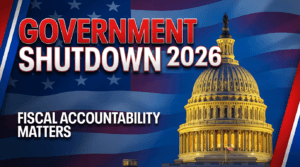Dublin City Council Navigates Political Tensions as September Brings Renewed Focus on Governance


Mayor Sherry Hu’s administration faces ongoing challenges following summer appointment controversy while advancing key city initiatives
Dublin, California – As September 2025 draws to a close, the city of Dublin finds itself in a period of political recalibration following a turbulent summer that exposed deep tensions within the newly configured City Council. The events of July, which saw a dramatic rejection of mayoral appointments, continue to cast shadows over municipal governance even as the council works to address pressing community needs.
The July Turning Point
The political landscape in Dublin shifted dramatically in July 2025 when the City Council delivered a stunning rebuke to Mayor Sherry Hu, rejecting two of her key appointments in a contentious 3-2 vote. The rejection of Jackson Berg for the Heritage and Cultural Arts Commission and Michael Goldstein for the Senior Center Advisory Committee marked the first major confrontation between Hu and her council colleagues since taking office following her November 2024 electoral victory.
The opposition coalition, led by Vice Mayor Kashef Qaadri and including Council members Jean Josey and Michael McCorriston, cited multiple concerns about the appointment process. Their primary objection centered on Mayor Hu’s decision to bypass Victoria Liu, an alternate with seniority who was next in line for the commission position. Critics also pointed to what they characterized as a “lack of transparency” in the application process and questioned the completeness of some applications.
The controversy was particularly sensitive given that Goldstein had endorsed Hu during her mayoral campaign, raising questions about potential political favoritism. Council member McCorriston was particularly vocal, describing Goldstein’s application as “incomplete” and “underwhelming,” while emphasizing the importance of following established procedures.
This wasn’t an isolated incident, as council members referenced Mayor Hu’s February 2025 appointment of Matthew Aini to the Planning Commission, where she had similarly bypassed qualified alternates. The pattern suggested a broader disagreement about mayoral prerogatives versus established council procedures.
Political Dynamics and Resolution
The July conflict revealed significant fault lines within Dublin’s political establishment. Only Council member John Morada supported Mayor Hu’s initial choices, highlighting her isolation on the issue. The 3-2 vote demonstrated that despite her electoral mandate, Hu faced a council majority willing to challenge her decisions when they felt proper procedures weren’t followed.
However, the situation also showcased the council’s capacity for compromise. After the initial rejection, Mayor Hu revised her appointments, nominating Victoria Liu for the Heritage and Cultural Arts Commission and Regis Harvey for the Senior Center Advisory Committee. These revised appointments passed unanimously, suggesting that the opposition was more about process than personalities.
The resolution indicated that while council members were willing to assert their authority, they weren’t interested in prolonged political warfare. The unanimous approval of the revised appointments demonstrated that when proper procedures were followed, the council could work collaboratively with the mayor.
September: A Return to Governance
As September unfolded, Dublin’s political focus shifted from internal conflicts to substantive policy issues. The City Council’s recent activities, as documented in official meeting minutes and civic alerts, reveal a administration working to move beyond the summer’s controversies and address community priorities.
One of the most significant developments has been the council’s authorization of California Vehicle Code enforcement on privately owned roads within the Wallis Ranch subdivision. This decision, while seemingly technical, reflects broader issues about municipal authority, public safety, and the rights of residents in private developments. The authorization demonstrates the council’s willingness to extend city services and enforcement into areas that traditionally operated under private management.
The council has also been actively welcoming new city staff members, suggesting ongoing efforts to strengthen municipal capacity. These personnel additions come at a time when Dublin, like many Bay Area communities, faces significant challenges related to housing, infrastructure, and public services.
Community Engagement and Leadership Style
Throughout these political developments, Mayor Hu has maintained her commitment to community engagement through initiatives like “Pizza with the Mayor” events. These informal gatherings represent an attempt to build direct relationships with residents and demonstrate accessible leadership, even as she navigates challenging council dynamics.
The mayor’s approach reflects a broader trend in local politics toward more direct community engagement, particularly important in a city that recently transitioned to district-based elections. The November 2024 elections marked Dublin’s first district-based voting, fundamentally changing how residents relate to their elected representatives.
Broader Context and Challenges
Dublin’s political developments occur against the backdrop of significant regional challenges. As part of the rapidly growing Tri-Valley region, the city faces pressures related to housing affordability, traffic congestion, and maintaining community character amid rapid development.
The city’s participation in the ADU (Accessory Dwelling Unit) Accelerator Program demonstrates ongoing efforts to address housing challenges through innovative approaches. This initiative, aimed at increasing housing options through accessory dwelling units, reflects the kind of pragmatic policy-making that transcends political divisions.
Recent emergency responses, including firefighting efforts for a 40-acre wildfire, highlight the ongoing need for effective municipal services and regional coordination. These practical challenges require the kind of collaborative governance that the July appointment controversy temporarily disrupted.
Looking Forward: Lessons and Implications
The events of July and their aftermath offer important insights into Dublin’s political culture and governance challenges. The council’s willingness to challenge mayoral appointments demonstrates institutional independence and commitment to established procedures. However, the ultimate resolution through compromise suggests that Dublin’s political leaders recognize the importance of functional governance over political point-scoring.
For Mayor Hu, the experience appears to have reinforced the importance of following established procedures and building consensus before making significant appointments. The unanimous approval of her revised appointments suggests that when proper processes are followed, she can expect council support.
The controversy also highlights the ongoing adjustment to Dublin’s new district-based election system. With representatives now accountable to specific geographic constituencies, council dynamics may be more complex than under the previous at-large system.
Conclusion
As September 2025 concludes, Dublin finds itself in a period of political maturation. The summer’s appointment controversy, while challenging, ultimately demonstrated the resilience of the city’s democratic institutions. The council’s ability to assert its authority while ultimately working toward compromise suggests a healthy balance between executive leadership and legislative oversight.
Moving forward, the key challenge for Mayor Hu and the council will be maintaining this collaborative spirit while addressing Dublin’s substantial policy challenges. The city’s rapid growth, housing pressures, and infrastructure needs require sustained political cooperation and effective governance.
The events of recent months suggest that Dublin’s political leaders are learning to navigate their new roles and relationships. While tensions may persist, the ultimate resolution of the appointment controversy and the council’s continued focus on substantive policy issues indicate a maturing political culture capable of addressing the challenges facing this dynamic Bay Area community.



